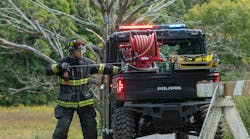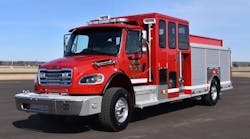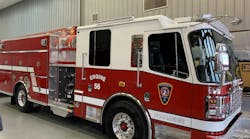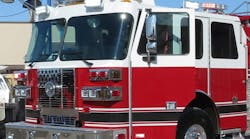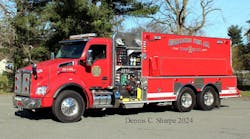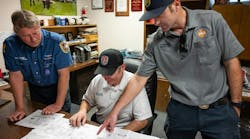The plague is alcohol in fire stations - or in firefighters (what follows may also be said of illegal drugs). This is a serious look at what occurs when firefighting and alcohol are mixed and the very high price that is paid by everyone involved. The high price was evident in my last column (see Emergency Vehicle Operations, July 2003) concerning the death in Newcastle, WY, of a 16-year-old Explorer firefighter and the arrest of an apparatus operator on charges of aggravated vehicular homicide. Also paying the price are the officers and members of the Newcastle Fire Department, officials in Weston County and even the state of Wyoming itself. This essay is not meant to demean anyone directly or indirectly involved with this tragedy, but rather it is my hope that everyone in the fire service will learn and take a stand against alcohol in the fire service so that history does not repeat itself.
To recap, the Explorer firefighter, Anndee Huber, and the apparatus operator, Ronald Caillier - volunteers with the Newcastle Fire Department - were responding in a fire department tanker to a rekindle of railroad ties on the night of May 22. The tanker was one of five apparatus responding in the emergency mode at the time. On the way, the tanker rolled over. Huber was thrown out of the vehicle and killed. A Wyoming state trooper's report lists Caillier's blood alcohol level at 0.086% two hours after the accident. That's above Wyoming's legal limit of 0.08%. Caillier told troopers he swerved to avoid hitting an antelope on the highway. He has pleaded not guilty to aggravated vehicular homicide. If convicted, he could face up to 20 years in prison and up to a $10,000 fine. No date has been set for Caillier's next court appearance.
As with any tragedy there were many signs and signals that problems were unrecognized or ignored, or a combination of both. Many times in this column, I have written about response policies that are in line with the national definition of a "true emergency," as it relates to the situation to which a fire department is responding. In my opinion, sending five pieces of fire apparatus in the emergency mode to a rekindle of railroad ties is not in line with the definition of a true emergency, and I would suggest that a reduced response may have prevented this accident.
The mandatory use of seatbelts - another favorite topic of this column - apparently was ignored in this instance. It appears that neither firefighter in the tanker was using a seatbelt at the time of the accident. Seatbelts save lives. Could a seatbelt have saved the life of Anndee Huber? No one will ever know.
I was born and raised in a small town where everybody knows everybody. More important, everybody knows everybody's business. It would appear that Newcastle is a similar town. According to Newcastle Volunteer Fire Department records obtained and reported by the Newcastle News Letter Journal, the local newspaper, Caillier was suspended from active duty in September 2001 for six months for violating section two of the department's policies, which in part states, "No member shall appear on duty in a state of intoxication." That suspension followed an altercation between Caillier and a Weston County assistant fire warden. Court records indicate that the warden pressed charges of battery. Caillier's record also shows that he was convicted of driving under the influence of alcohol last September, and recently served weekends in jail for violating the conditions of his parole. So then one must ask the question, why was he allowed to drive a fire apparatus? Was it the case that everybody knew that there was a problem, but nobody did anything about it? Is the Newcastle Fire Department the only fire department with this kind of problem? Heck no.
Every firefighter in the fire service can relate a story about the driver he would never ride with because the guy was a drunk, he drove too fast or was an accident just waiting to happen.
The next issue is leadership. It would be unfair of me to comment on the leadership in Newcastle; I was not there and I do not know the parties involved. Besides, they have been going through hell. But I can comment on fire service leadership in general, or the lack thereof that I have seen.
Being a fire chief in this day and age is one of the most challenging, toughest jobs on the face of the earth. The modern fire chief must balance the need for discipline with the need to get firefighters to show up, to be motivated and to do the job. I am familiar with two basic types of fire chiefs. One is what I call the "good ole boy" fire chief. He is the guy who buys the most beers an hour before the election and wins hands down. The good ole boy fire chief knows everybody, does not want to create any waves, wants no confrontation, wants to be a friend to all and so sticks his head in the sand for the duration of his term in office. The good ole boy fire chief hopes beyond hope that Newcastle, WY, does not happen on his watch. At the end of his term, he takes his head out of the sand and goes to the annual banquet, where accolades and gifts are heaped upon our hero as he goes off into the sunset. During the good ole boy fire chief's term, the fire department suffers from stagnation and apathy.
On the other hand, we have what I will call the "modern fire chief" who strives to better himself and his department. This is a person who makes the tough choices, who is firm, yet fair; a person who leads by example. This is a fire chief who may not be liked by all, but is respected by everyone, especially for his leadership skills.
Fire service leadership takes many forms, but I would like to mention three fire service leaders who wrote excellent editorials following the death of Anndee Huber. Dr. Harry Carter, Dave Iannone and Chief Billy Goldfeder wrote editorials on the Firehouse.com website denouncing alcohol in the fire service and urging an end to the fire service's thirst for mixing alcohol and firefighting. I respect these leaders and I too would like to add my voice to put an end to this behavior once and for all.
Many fire stations serve alcohol. When I first joined the fire service, the fire station was considered the poor man's social club. Firefighters had a reputation of getting drunk and saving chimneys and foundations. Although some fire stations have banned the use of alcohol on fire department property and today we save a lot more than chimneys and foundations, many fire stations still serve alcohol.
Here is a case in point: A friend of mine told me that he attended a wedding in Pennsylvania. The wedding reception was in the local fire station's social hall. The attendees at the wedding reception included a number of firefighters from this particular fire station. The reception was progressing nicely, including everyone drinking, having a good time, with some drinking in excess. As luck would have it this fire station received an alarm for a fire and much to my friend's surprise all of the firefighters assigned to this station, in varying degrees of sobriety or the lack thereof, boarded the fire apparatus to respond to the call.
Most of you have heard the argument: if we take the beer out of the firehouse, the volunteers will quit. My answer to that is, if your leading reason for being a firefighter is so that you can go to the firehouse and drink, then frankly we do not need you or the liability that you bring with you. Also, if you need to drink, then you may have bigger problems than the fire department can help you solve. Rules: You can make all the rules, policies, SOPs or SOGs, or whatever we are calling them this month, but the reality is that if alcohol is available in the firehouse, some firefighters are going to drink, and if the alarm goes off for a fire, some of those firefighters who have been drinking are going to respond.
The next argument goes back to leadership. If alcohol is available in the firehouse, is the department going to control its consumption? If so, which people or what person within the organization is going to assume the role of the bad guy and enforce the policy? History tells us that fire stations, fire companies and fire departments have been closed and put out of business due to liability awards surrounding the serving and/or consumption of alcohol. However, I am not sure that the same thing can be said for firefighters who have quit due to the unavailability of alcohol. Have any fire stations closed because we turn off the beer taps and had firefighters quit in mass? I don't think so.
What if your children had the same attitude about a specific issue - I will not be a firefighter anymore if they take my beer away. How childish does that sound? If your children were to react like that how would you feel? As a parent what would you do?
When the Newcastle, WY, tragedy was brought to light, one fire service leader's reaction was naive, if not truly scary. The stated reaction was one of surprise, that the events in Newcastle were an aberration, that alcohol in the fire service went the way of horsedrawn fire apparatus and does not represent a problem in the modern-day fire service. If you believe that, you had better pull your head out of the sand and get a reality check.
Which recent events, which occurred within the past few months, would you like to talk about? A fire truck crash in Indiana that occurred when a fire chief put a fire truck he was allegedly driving in a ditch after losing control on a curve. A short time later, the same chief reappeared in another fire department vehicle to pull the first vehicle out of the ditch. Investigators became suspicious and promptly administered a field sobriety test at the scene of the crash, which he allegedly failed. Or the Connecticut fire department that was urged by the town's mayor to remove pictures of beer-drinking firefighters from the fire department website after a civilian complaint. The civilian who visited the fire department website was looking for fire safety tips and pictures of fire trucks to show her son. Much to her shock and dismay, she came across the pictures of beer-drinking firefighters. Or the Pennsylvania fire engine that failed to respond because of an ongoing internal dispute in which one of the parties had been suspended for allegedly having alcohol on his breath at a fire scene. Or the Oregon firefighter who died at a convention after a night of fraternity-style binge drinking. It was reported that local police found evidence of partying by dozens of the 300 firefighters at the annual training conference. The police report suggests other firefighters urged the underage victim to drink as a show of esprit de corps. The drinking that occurred was reported to be totally out of character for the hardworking mother of a 3-year-old child. By the way, it was also reported that the victim had consumed three times the legal limit, although she died due to a fall and the resulting head trauma, alcohol consumption played a major role in her death. Or the Wyoming fire chief who was impaired while responding to a car fire. A police officer, after smelling alcohol on the breath of the fire chief, performed a Breathalyzer test that he failed. A couple of things said by the principles involved are noteworthy. It was reported that the fire chief said, "I can't say I wasn't over the legal limit. I was not impaired to the point that I could not do my job." The public information officer stated that, "Consuming one alcoholic beverage more than an hour before a call-out would not, in most cases, keep a fireman from joining a crew on a truck."
We just do not seem to get it. If you consume any amount of alcohol and as long as any amount of alcohol is in your system, you are a liability to the fire department and you should be out of service. Ironically, this is the same state where Anndee Huber lost her life less than two months ago and where the state fire marshal called for a ban of all alcohol in all fire/EMS stations across the state. How sad!
In a perfect world alcohol should be banned in all fire/EMS stations across the country. But I have been in the fire service for far too long and I am not so naive to believe that a total ban could ever be accomplished. However, if a total ban cannot be established, then someone or some group within the fire department needs to establish and maintain strict control over any serving of alcohol on fire department premises. Don't drink and ride.
Although alcohol was served at the Newcastle fire station, Caillier was seen leaving a drinking establishment and not the station around the time of the call that cost Anndee Huber her life.
I finally put the word "Outrage" in the title of this column. It was just reported that the Newcastle Fire Department recently voted to ban the use of alcohol on fire department property and some members actually voted against the ban. I felt outrage; I hope you do too. Will we ever learn?
Anndee Huber was killed in the line of duty and as with any line-of-duty death in the fire service we will memorialize her and always remember her. Perhaps there will even be a monument built in her memory.
But I have a better idea: why don't fire service leaders back a nationwide ban on the consumption and serving of alcohol on fire department premises? That would truly be a lasting memorial and would turn Anndee Huber's tragic death into a living legacy that will prevent another preventable tragedy like her death from ever happening in the same manner again.
Michael Wilbur, a Firehouse® contributing editor, is a lieutenant in the New York City Fire Department, assigned to Ladder Company 27 in the Bronx, and has served for the past five years on the FDNY Apparatus Purchasing Committee. He has consulted on a variety of apparatus related issues throughout the country. For further information access his new website at www.emergencyvehicleresponse.com.